I haven’t had the chance to blog for a while. I was going to do a whole Q&A about the dead and ancestor veneration. But sometimes, a topic comes up that is just so front and center in the old noggin that you just can’t ignore it.
I’d like to talk (rant?) today about Heathenry. Or rather the bullshit that drags Heathenry down and sullies its gold.
I’ve been a Heathen for a long time. Honestly, I’ve been Heathen longer than some of you good folks have been alive. I’m married to a Heathen too, and magical adventures aside, our collective hearth cult is predominantly Heathen.
For me, Heathenry is, as my friend Andrea would say, “a heritage of gold”. The stories you find in the Old Norse and Germanic sources hold true beauty and wisdom if you have eyes to see it.
But the problem is, not everyone has eyes to see that gold, and all too often, those stories become tainted by the toxic filters we ourselves can bring to those texts.
The Eyes and Hearts We Bring to Myth
In many ways, these stories can be like a Rorschach test that reveals the inner insecurities and fears of a person. This is what is really at the root of the incessant fapping off over Vikings, and toxic ideas about tribe and ancestry. The people who fall into these traps want to feel anything but what they actually feel. They don’t want to feel all those insecurities and fears, and so they try to mask it with what they perceive as “strength”. This is the core of what is at stake for a fascist. This is why they fight so hard against anything resembling sense.
In doing this though, they only achieve the opposite. It’s no kind of strength to run or hide from one’s feelings, or to hate people who look different to you. Hate isn’t strength. The ‘separate but equal’ nonsense that’s often dressed up as ‘I just want to be with “my folk” (but don’t really hate others)’ isn’t strength either. ( Hot tip: If that’s an explanation you’re going with, you’re just in the phase where you’re still trying to find “polite” ways of saying “POC scare me and/or give me an inferiority complex”.)
Whereas my Heathenry is expansive and wondrous, theirs is reductive and cuts out anything that discomforts them. Where they only see trees in  isolation, mine sees each tree as it is: connected through roots and mycorrhizal fungi to other trees. Trees that have been found to provide mutual aid to each other regardless of tree ‘type’.
isolation, mine sees each tree as it is: connected through roots and mycorrhizal fungi to other trees. Trees that have been found to provide mutual aid to each other regardless of tree ‘type’.
In Völuspá, the story goes that people come from trees. This isn’t scientifically true but we could learn a lot from trees all the same.
Just don’t try to give me that tired old adage about how ‘a tree without roots will fall’, and act like it somehow sensibly explains the obsession with DNA and skin color. Because the Hávámál the far right Heathens like to quote so much says nothing about tree roots and ancestors.
You know what it does talk about though? Having people who love you:
The withered fir-tree which stands on the mound,
neither bark nor needles protect it;
so it is with the man whom no one loves’
why should he live for long?
Hávámál 50, Larrington trans.
Without love, every person falls.
The Groaning Tree
Yggdrasil shudders, the tree standing upright,
the ancient tree groans, and the giant is loose.
Völuspá 47, Larrington trans.
In all honesty, I’m tired of trying to keep the gold clean, but it’s important to keep trying all the same. This is a sacred duty, and for too long we Heathens have allowed the ill to define us. Worse still, when we form communities, we often do so by defining what we are not as opposed to what we are, and in this way they shape us too. I don’t know that this is the same in other parts of the world, but this has very much been my experience in the US Heathen scene.
However in my opinion, this is entirely the wrong way to build community and/or counter the far right elements in our faith.
We need to begin by naming these people for what they are.
These are not people who are hale and whole. They’re damaged and broken on the inside. They are not inheritors of that gold, and no amount of DNA-testing, ‘pure-blood’ anything will make them so.
the ancient tree groans, and the giant is loose
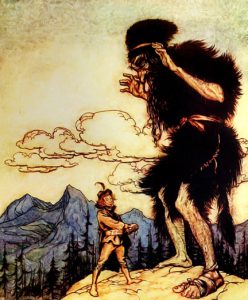 The word Jötunn is thought to come from the Proto-Germanic *etunaz, which is in turn thought to be semantically connected to the Proto-Germanic *etanan, or ‘greedy’, ‘voracious’, ‘gluttonous’, ‘consuming’. Although the above snippet from Völuspá pertains to Ragnarök, it is also relevant here.
The word Jötunn is thought to come from the Proto-Germanic *etunaz, which is in turn thought to be semantically connected to the Proto-Germanic *etanan, or ‘greedy’, ‘voracious’, ‘gluttonous’, ‘consuming’. Although the above snippet from Völuspá pertains to Ragnarök, it is also relevant here.
Fascism is inherently greedy. It always requires an ‘other’ to sacrifice, then turns on people in the in-group who are not quite “in” enough to appease that greed. It is an evil Thurs, a ravenous spirit, and those in its thrall are equally ravenous.
This is how we should be naming this evil. They are, or are possessed of greedy, greedy, spirits who will never be sated and who can only be driven out.
Jotnar.
Þursar.
‘Þurs of wound-fever, lord of the Þursar! Flee now! (You) are found. Have for
yourself three pangs, wolf! Have for yourself nine needs, wolf!
III ice (runes). These ice (runes) may grant that you be satisfied (?), wolf.
Make good use of the healing-charms!’
Runic healing charm from Sigtuna, Sweden.
‘Runic Amulets and Magical Objects’ by Mindy MacLeod and Bernard Mees
Have for yourself three pangs, wolf! Have for yourself nine needs, wolf!
These ice runes may grant that you be satisfied, wolf!
It’s not often we get usable models. We should probably take advantage of them when we do.
The Stone Turns at the Command of an Unjust King
There’s a story in the Poetic Edda that I’ve found myself thinking about quite a lot recently. It’s called ‘The Song of Grotti’, and in it a king takes two female slaves and puts them to work endlessly at a magical millstone, forcing them to grind out endless wealth with little thought for their welfare or basic needs. He is beyond all shadow of a doubt, an unjust king.
We too live in an unjust society in which workers are increasingly expected to 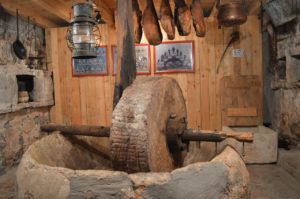 produce with little concession to human wants or needs. Productivity and profit have become king now, and people work like cattle but then struggle to survive regardless of their labor.
produce with little concession to human wants or needs. Productivity and profit have become king now, and people work like cattle but then struggle to survive regardless of their labor.
This is exactly the kind of environment that produces fascists. With the help of some already extant racial biases, it produced fascists in the 30s, and is producing them now.
Wealth let’s grind for Frodi, grind out happiness,
grind many possessions on the wonderful stone!
Let him sit on his wealth, let him sleep on a quilt,
let him wake to happiness! That is well ground out.
At first, the women sang their songs and ground out wealth for Frodi. But again and again he denied them pleasure, rest, and warmth. Over time, the women became angry, remembered their mighty deeds before being forced to Frodi’s hall.
Now we have come to the dwellings of the king
without mercy, and live as slaves,
mud eats away at our feet, the rest of us is chilled through,
we drag the calmer of strife; it’s dull at Frodi’s house.
But what do you think they did next?
Did one blame the other for the king’s greed and lack of compassion? This is essentially the option offered by fascism and does nothing to address the underlying issues that make people so miserable in the first place.
No. The women worked together and turned the magic millstone against Frodi, churning out woeful fate for the unjust king. (The Marxists among you will laugh at how they seized the means of production in this tale.)
Hands shall grip the hard shafts,
the bloodstained weapons, wake up, Frodi!
Wake up, Frodi, if you want to hear
our songs and ancient tales.
I see fire burning east of the city,
warfare awakened, that must be a beacon;
an army is coming here very shortly,
it will burn the settlement despite the prince.
You shan’t hold onto the throne of Lejre,
the red-gold rings, nor this magic grindstone.
Let’s seize the handle, girl, turn more swiftly!
We are not yet warmed by the blood of slaughtered men.
By the end of the tale, the king is dead and millstone destroyed. The women are now free from their endless labor
There are lessons to be learned here too, but it is the central lesson you find over and over again in these texts (along with punishments for bad or violated hospitality): stick together, work together, fight together.
And that for me is what Heathenry is about. It is a religion of relationship and relationality with human and otherworldly people alike. Of gifting and story. Of rainbow bridges made of fire, and a shared world alive around us. It’s a religion of magic too. In which people may send parts of themselves forth, speak prophecy, ensnare and bind, and break weapons with charms.
It’s a religion of beauty, the most precious of gold, and I’m asking you to help me keep that gold clean.




 magical attack. Because if you place too much belief in the possibility of being cursed or attacked, then it’s all too easy to see malefic magic and psychic attack at every turn and become paranoid. There’s also a lot to be said for self-fulfilling prophecy here – especially with the more magically-minded. But if you refuse to even consider the possibility, then you run the risk of missing some of the earlier warnings and allowing things to become far worse.
magical attack. Because if you place too much belief in the possibility of being cursed or attacked, then it’s all too easy to see malefic magic and psychic attack at every turn and become paranoid. There’s also a lot to be said for self-fulfilling prophecy here – especially with the more magically-minded. But if you refuse to even consider the possibility, then you run the risk of missing some of the earlier warnings and allowing things to become far worse. This is where it gets pretty tricky, and also why you shouldn’t just rely on one thing when assessing whether or not you’ve been cursed. However, a good starting question to ask yourself is if what is happening is logical given the surrounding causes and conditions. For example, if you happen to lose your job and your house is foreclosed on during a time of economic downturn, it’s easy to see the circumstances at the root of your situation.
This is where it gets pretty tricky, and also why you shouldn’t just rely on one thing when assessing whether or not you’ve been cursed. However, a good starting question to ask yourself is if what is happening is logical given the surrounding causes and conditions. For example, if you happen to lose your job and your house is foreclosed on during a time of economic downturn, it’s easy to see the circumstances at the root of your situation. by accident from others, or the result of a curse directed at you.
by accident from others, or the result of a curse directed at you. dying off, then there’s a chance that someone is working against you. This is especially the case when this happens in conjunction with any of the other factors mentioned here. Some folks also keep an egg on their altar as a kind of hex alarm and watch for it breaking. Of course, you may go through quite a few eggs, and will need to remember to change them out if you opt to do this.
dying off, then there’s a chance that someone is working against you. This is especially the case when this happens in conjunction with any of the other factors mentioned here. Some folks also keep an egg on their altar as a kind of hex alarm and watch for it breaking. Of course, you may go through quite a few eggs, and will need to remember to change them out if you opt to do this.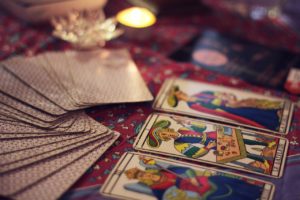 often forgotten. And I get it, it’s easy to lose your head when you suspect that magic is being thrown around – especially if you’re already a little battle-scarred before figuring out what’s going on. However, if someone is working against you and you give into that fear, you help them in their cause.
often forgotten. And I get it, it’s easy to lose your head when you suspect that magic is being thrown around – especially if you’re already a little battle-scarred before figuring out what’s going on. However, if someone is working against you and you give into that fear, you help them in their cause.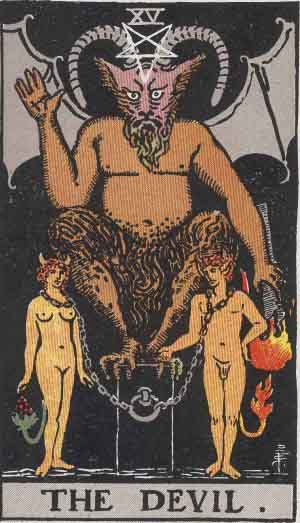

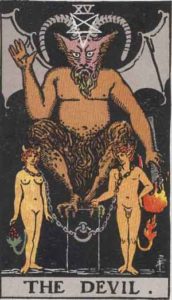 or they sort of ferment over time. In my experience of these slow wars, you usually have about 2-3 years of fermentation punctuated by relatively minor periods of being poked at before hostilities fully escalate.
or they sort of ferment over time. In my experience of these slow wars, you usually have about 2-3 years of fermentation punctuated by relatively minor periods of being poked at before hostilities fully escalate. of the heavy-lifting here, so these are the relationships you really need to cultivate.
of the heavy-lifting here, so these are the relationships you really need to cultivate. You see, sometimes witch wars involve sending asshole spirits to mess with you, and those asshole spirits tend to gravitate to the shitty, cluttered areas of your home like mosquitoes do to buckets of water. (This is pretty much why paranormal teams get people to clean up as part of the solution.)
You see, sometimes witch wars involve sending asshole spirits to mess with you, and those asshole spirits tend to gravitate to the shitty, cluttered areas of your home like mosquitoes do to buckets of water. (This is pretty much why paranormal teams get people to clean up as part of the solution.) starts the war.
starts the war. these things, gains the keys to the kingdom. There is so much more that they can do to you with this stuff- trust me on this. Because there was this one fun time and it literally nearly fucking killed me.
these things, gains the keys to the kingdom. There is so much more that they can do to you with this stuff- trust me on this. Because there was this one fun time and it literally nearly fucking killed me.